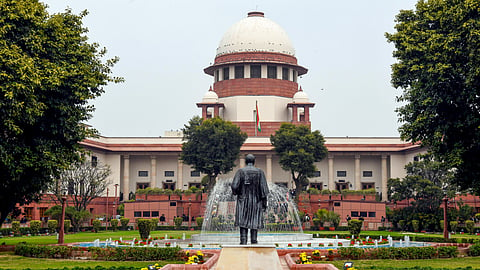

NEW DELHI: The Supreme Court on Thursday said that it would hear a batch of petitions challenging the constitutional validity of the Waqf (Amendment) Act, 2025, on May 20.
SC will consider whether an interim order is required or not on three major issues - waqf by user, nomination of non-Muslims to Wakf Council and Boards, and identification of government land under wakf.
The two-judge bench of the apex court, led by the Chief Justice of India (CJI) Bhushan Ramkrishna Gavai, however, clarified that it would not consider hearing on May 20 any petition challenging the validity of the Wakf Act, 1995, by Hindu parties while considering the need for passing any interim order.
The top court on Thursday extended the earlier order till May 20 on the assurance given by the Solicitor General (SG) Tushar Mehta, senior law officer of the Centre, that no waqf properties, including those established by user, would be identified.
He assured that no appointments to the Central Waqf Council or State Waqf Boards would be made under the 2025 Act, till May 20.
Mehta also told the Supreme Court that he has filed a detailed response and affidavit on the three issues identified by the apex court in the Waqf case.
Earlier, the matter was heard by a three-judge Bench comprising the CJI (former) Khanna, and Justices Sanjay Kumar and KV Viswanathan.
The top court had, in its last hearing, said the Centre has raised some points on registration of waqf properties, which would require a detailed hearing by the court.
"I do not want to reserve any judgment, or even an interim order, at this stage. This matter will have to be heard on a reasonably early date, and this will not be before me. If you all agree, we post it before a bench of Justice Gavai," said the CJI (now retired) Khanna.
The apex court was hearing five petitions -- out of more than 100 -- after noting that it was impossible to hear all the pleas in the matter, as more or less, the petitions were strikingly similar.
The Centre, on April 25, defended the Wakf Amendment Act, 2025, as a valid, lawful exercise of legislative power. While filing a detailed reply in the Supreme Court, the Union requested that it dismiss the batch of petitions challenging the constitutional validity of it.
"It is a settled position in law that constitutional courts would not stay a statutory provision, either directly or indirectly, and will decide the matter finally," said the Centre, in its reply filed before the top court.
The UOI filed the reply after complying with the top court's order asking it to file the same before it.
The Centre said that after 2013, there was an addition of over 20 lakh hectares (precisely 20,92,072.536) in waqf land.
"For the last 100 years, waqf by user is recognised only upon registration and not by word of mouth. Hence, the amendment was in sync with consistent practice. There will be maximum of two non-Muslims among 22 members in the Waqf Council and Aukaf Boards, a measure that is representative of inclusiveness and not intrusive of the administration of waqfs," the Centre said.
The affidavit added that the identification of government land deliberately or wrongly mentioned as waqf properties is to set the revenue records right and that government land cannot be treated as land belonging to any religious community.
The Centre, in its 1,332-page preliminary counter affidavit, submitted that there cannot be a "blanket stay" on the law as there was a "presumption of its constitutionality".
The Centre submitted that the law was not violative of the fundamental rights guaranteed under the Constitution. "The amendments are only for the regulation of the secular aspect regarding the management of the properties and hence, there was no violation of the religious freedoms guaranteed under Articles 25 and 26 of the Constitution," it said.
Vehemently opposing the batch of pleas, which challenged the constitutionality of the Waqf Amendment Act, the Centre said that taking away the statutory protection to a Waqf-by-user does not deprive a person of the Muslim community to create a Waqf.
"Deliberate, purposeful and intentionally misleading narrative, is built very
mischievously, giving an impression that those Waqfs (including ‘Waqf-by-user’) which do not have a document to support their claims will be affected. This is not only untrue and false but purposefully and deliberately misleading this court,” the Union, in its affidavit, said.
The Centre also asserted that the changes will not make Muslims a minority in the Central Waqf Council and Waqf Boards. "The maximum possible number of non-Muslims in the Central Council is four out of 22 members and in the Boards is three out of 11 members, assuming the ex-officio members are also non-muslims," the reply stated.
The Centre added that managing the large number of waqf properties across the country, which include land, buildings, and financial assets dedicated to charitable and religious causes, involves significant secular activities.
The batch of petitions had challenged the Waqf Amendment Act by submitting that it was discriminatory towards the Muslim community and violated their fundamental rights.